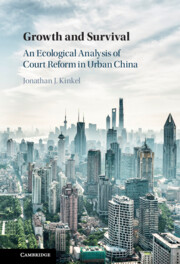Book contents
- Growth and Survival
- Growth and Survival
- Copyright page
- Dedication
- Contents
- Figures
- Tables
- Acknowledgments
- Abbreviations
- 1 Introduction
- 2 An Ecological Theory of Court Reform in Urban China
- 3 The Judicial Cadre Evaluation System
- 4 High-End Demand for Legal Services and Local Pressure to Professionalize the Judiciary
- 5 Expansions in Competitive Promotion and the Implications for Judicial Autonomy
- 6 Court Personnel, Bureaucratic Specialization, and the Limits of Top-Down Theory
- 7 Conclusion
- Appendix Summary of interviews regarding local lawyer salaries (2014)
- References
- Index
6 - Court Personnel, Bureaucratic Specialization, and the Limits of Top-Down Theory
Published online by Cambridge University Press: 26 May 2022
- Growth and Survival
- Growth and Survival
- Copyright page
- Dedication
- Contents
- Figures
- Tables
- Acknowledgments
- Abbreviations
- 1 Introduction
- 2 An Ecological Theory of Court Reform in Urban China
- 3 The Judicial Cadre Evaluation System
- 4 High-End Demand for Legal Services and Local Pressure to Professionalize the Judiciary
- 5 Expansions in Competitive Promotion and the Implications for Judicial Autonomy
- 6 Court Personnel, Bureaucratic Specialization, and the Limits of Top-Down Theory
- 7 Conclusion
- Appendix Summary of interviews regarding local lawyer salaries (2014)
- References
- Index
Summary
This chapter bolsters the overall ecological theory of court reform by assessing an alternative explanation rooted primarily in top-down, state-centered logic – one assuming that leaders from the central CCP, state, or both have comprehensively determined the nature and extent of institutional change. One mechanism by which legal forms like judicial selection and promotion mechanisms could change in top-down fashion would be the central Party–State’s allocation of judicial personnel headcount (i.e., bianzhi) to local courts through the personnel management system. This chapter, however, presents evidence that this is not the case – despite differences in geography and development, court systems in Chengdu, Shenzhen, and Shanghai all demonstrated robust capabilities during the post-Mao era to expand and diversify their court and judicial structures, suggesting that top-down theories of court politics do not explain the local variation I describe in this book.
Keywords
- Type
- Chapter
- Information
- Growth and SurvivalAn Ecological Analysis of Court Reform in Urban China, pp. 127 - 147Publisher: Cambridge University PressPrint publication year: 2022

